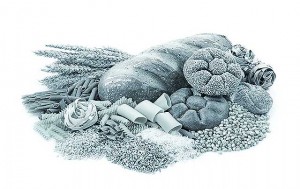

Training for a Half Marathon Diet
Running Lifestyle April 17, 2014 admin 1

Running a half marathon is a big undertaking and is very taxing on your body. When training for a half marathon, following a plan and building your strength and endurance is extremely important. However, many people forget that other parts of their lifestyle, such as sleep and diet, is just as important to finishing strong.
Without a proper diet, running long distances can deplete your energy and slow you down. When running long distances, your body quickly depletes its stores of glycogen, derived from dietary carbohydrates, to provide glucose to your muscles. Finishing a half marathon strongly requires adequate glycogen levels before and during the race. One of the most important diet tips to remember during training and race day is to eat in a way to maximize glycogen stores. Below are some helpful tips for creating a half marathon training diet.
General Advice on Maintaining a Good Half Marathon Diet
Most athletes are told to increase their carbohydrate intake in order to build their glycogen stores. Even though there are a few experts who recommend a low-carbohydrate diet during training, most experts tell runners that more carbs are always better. Numerous studies from University of Birmingham have compared runners’ performances on a low-carb diet versus a high-carb diet. These studies have shown that a high carbohydrate intake allows runners to train harder, improve endurance, and improve overall performance.
While increasing carbohydrate intake is most important in the days leading up to the race, it is important to think about boosting your carb intake earlier in your training. Especially with long run mileage increasing each week, it is helpful to boost your carbohydrate consumption to match these longer distances.
When increasing carbohydrate intake during half marathon training, runners need to be careful that they also maintain a balanced diet. Carbohydrates are important for energy supply, but other foods are just as important in your half marathon training diet. Protein is necessary for muscle repairs, fat is needed for protecting organs, vitamins and minerals are necessary to keep you healthy, and calcium is needed for strong bones.
Additionally, runners need to carefully watch their diets and the types of calories they are consuming. Many people assume that runners must be fit and muscular with little body fat. However, this is not necessarily the case as many runners overcompensate for the exercise they do and eat more calories than they burned. In order to avoid this compensation effect, runners need to be careful about what they consume and eat more quality food that is less calorically dense. Foods that are recommended for runners to feel full without eating excess calories include vegetables, fruits, nuts, whole grains, lean meats and fish, and dairy. Foods that runners should avoid include refined grains, fatty meats, sweets, and fried foods.
Pre-Race Half Marathon Diet Advice
One of the biggest diet mistakes half marathon runners make is only fueling up on carbs the night before the race. Running 13.1 miles takes the average runner approximately 2 hours and fueling up on carbs the night before may not be enough to give you the energy needed to last the entire race. Rather than wait for the day before, most experts agree that half marathon runners should start carb loading at least two to three days before race day. Carb loading several days before the race gives your body time to digest, absorb, and store nutrients that will help you on race day. When carb loading, it is not necessary to increase your total calories consumed. It is important, though, to make sure that the majority of your calories consumed those days come from carbohydrates.
Another common mistake is to make dinner before race day the biggest meal. Experts recommend instead making lunch the big meal and eat something light for dinner. Stocking up at lunch gives your body more time to process the necessary nutrients to be ready for use while racing. Also, eating a big meal for dinner increases the risk of having stomach trouble and digestion issues during the race.
Breakfast on the day of the race should likewise be something small and simple. For all meals leading up to the race, it is best to stick with food items you used during training. It is never advisable to try something new right before race day because you don’t know how that particular food will make you feel on a run. For breakfast on the day of the half marathon many experts recommend something like toast, a bagel, or cereal. All of these foods are good sources of slow-releasing energy.
Fueling Advice on Race Day
In order to keep your energy up, it is recommended to eat something small during the race. After a little more than an hour of running, your body starts to deplete its stores of glycogen. Following this, your muscles run out of glucose to keep them powered and your energy levels drop. Consuming some food mid-run can keep your blood sugar steady to avoid this energy drop.
The most commonly cited figure is aiming for 30 to 60 grams of carbohydrates per hour. It is important to eat before you start feeling your energy levels weaken. If you let yourself become hungry and weak, it will be difficult for your body to catch back up even after you refuel. If you don’t eat something within the first hour, it is likely that your energy levels will drop and it will be difficult to recover. Eating 30 to 60 grams of carbs each hour should help prevent fatigue from inadequate glycogen.
Recommended food items during the half marathon include bananas, energy bars, dried fruit, or energy gels. Unless the race organizers or good friends provide food, it is probably best to stick to something small like energy gels. Try different foods, products, and brands during your training long runs to see what feels the best for you.
Diet Advice after the Half Marathon
Following the half marathon, it is important to get a mix of carbohydrates and protein into your body. After running 13.1 miles, your body will have depleted much of its glycogen store and you will need carbohydrates immediately. At the finish line, good food choices include bananas, fruit, yogurt, milk, muffins, and bagels. Not too long after the race, try to eat a meal that contains protein, carbohydrates, and some fats. Replacing the calories and nutrients you lost during the race is vital to help your body recover and rebuild muscles.
Hydration Advice for Half Marathon Training
Staying hydrated during a run is essential to your well-being. During your training phase, it is important to stay hydrated during the day. Carry water around with you during the day and drink constantly to prevent dehydration on your run. Everyone’s water needs are different depending on how efficiently one sweats, the intensity of one’s runs, weather conditions, etc. Pay attention to your body’s responses during training to determine if you are drinking enough water.
During short maintenance runs, you may not need to carry water with you, but it is important to drink water post-run. If your run is longer than an hour, bring water with you to hydrate during your run. Some people prefer sports drinks during training to help them replace lost minerals and electrolytes. Practice with both water and sports drinks to determine what drinks you prefer for race day.

Julie
May 2, 2015 #1 AuthorYou have good tips here. I find that eating healthy is the key to great training.